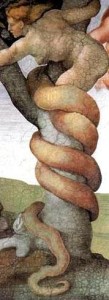
So this I say therefore, and affirm together with the Lord, that you walk no longer just as the Gentiles also walk, in the futility of their mind, being darkened in their understanding, excluded from the life of God because of the ignorance that is in them, because of the hardness of their heart; and they, having become callous, have given themselves over to sensuality, for the practice of every kind of impurity with greediness. – Ephesians 4:17-19 (NASB)
Reflection
In the first post of this series, we discussed how faith and learning were seamlessly integrated in God’s original creation. The fall of humanity into sin, however, resulted in the disintegration of faith and learning. Out of a desire to be independent of God, autonomous, and self-legislating, human beings entered into sin, which severed our communion with God. This mutiny entailed devastating noetic and epistemic consequences. Sin corrupted our minds and confused our knowledge. Having fallen from fellowship with God, our capacity to know and understand things from his point of view was lost. We ceased to acknowledge him as the maker of heaven and earth. We failed to see him as the infinite source, ultimate reference point, and explanatory principle of all reality. We no longer recognized the world as his creation. We no longer saw ourselves as his image and likeness. We misunderstood the nature of the human predicament and constructed false solutions to essential human problems.
To say that sin disintegrated faith and learning, not to mention faith and living, is an understatement. Another New Testament passage (Romans 1:21-23, 25), plus the passage above, clearly documents these things. However, the fact that sin disintegrated faith and learning does not mean that nothing took faith’s place. Because human beings are inescapably religious beings, to forfeit true faith does not result in no faith, but terminates in false faith. If nature abhors a vacuum, then human souls do far more. We cannot live without an object of devotion—an ultimate concern, a ground of being, a god, a goddess, or a supposed good that anchors our lives, centers our souls and selves, and helps us to name, know, and find our place in the world about us. To live without a faith of some kind is humanly impossible. As Langdon Gilkey has observed, “Whether he wishes it or not, man as a free creature must pattern his life according to some chosen ultimate end, must center his life on some chosen ultimate loyalty, and must commit his security to some trusted power. Man is thus essentially, not accidentally, religious, because his basic structure, as dependent and yet free, inevitably roots his life in something ultimate.” (Gilkey, p. 193)
Whatever this ultimate end, loyalty, or trusted power may be—a philosophy, a religion, a worldview, a cultural outlook, a political vision, a social cause, a personal passion—it serves as the new basis, reference point, and explanatory principle for how we understand reality and make our way in the world. All people live by faith. Scholars, professors, and students must recognize this. Based on inadequate views of human nature, one of the great mistakes of the modern period was to assume that human thought, especially of the theoretical, scholarly kind, could operate in an objective manner independent of underlying religious, philosophical, cultural, political or personal assumptions.
Even though the objectivist epistemological paradigm dies hard and still has considerable sway in education today, the recent postmodern critique of this outlook has shown that all our perceptions and preachments are grounded in and affected by various antecedent conditions. Furthermore, significant components of the Christian tradition have historically affirmed that faith of some kind, generously speaking, will always be foundational to and integrated with learning. In other words, all academicians, whether they know it or not, have faith of some kind and are believers of one sort or another. The question, of course, is which faith and what beliefs support their theoretical considerations and scholarly work. The fall did not erase all faith in human beings, but it caused the dis-integration of human learning and faith in God our Creator.
Thought
At the fall, faith and learning were dis-integrated.
Prayer
Lord, in my efforts to re-integrate my faith and my scholarship, help me to recognize how disintegrated all things became when we fell and took creation with us in that great fall, including faith and learning. In Christ’s name who lives and reigns with the Father and Holy Spirit—one God forever and ever. Amen.
Questions
Do you believe that faithlessness and belieflessness are humanly possible? Are human beings inescapably religious beings with various outlooks? If so, then what forms of faith and belief now ground academic and educational enterprises in a fallen world? What is your response to what Langdon Gilkey said in the quote above?
Further Reading
Langdon Gilkey, Maker of Heaven and Earth: A Study of the Christian Doctrine of Creation, Christian Faith Series (Garden City, NY.: Doubleday, 1959), p. 193.
Dr. David K. Naugle is chair and professor of philosophy at Dallas Baptist University. He has two doctorates, a Th.D. in systematic theology and a Ph.D. in humanities with concentrations in philosophy and English literature. Dr. Naugle is the author of Worldview: The History of a Concept (Eerdmans, 2002) and Reordered Love, Reordered Lives: Learning the Deep Meaning of Happiness (Eerdmans, 2008), a Christianity Today 2003 Book of the Year. Dr. Naugle is an avid golfer, gardener, guitarist and drummer. He and his wife, Deemie, who is the Associate Provost at DBU, and their dog “Kuyper” live in Duncanville, Texas, a Dallas suburb.

Leave a Reply